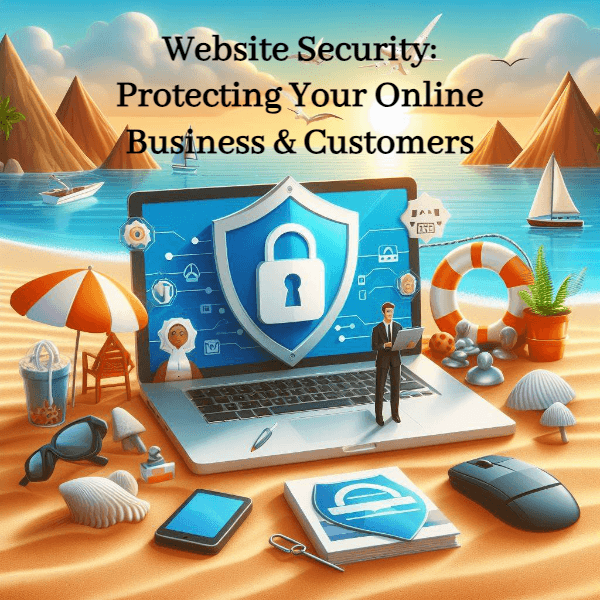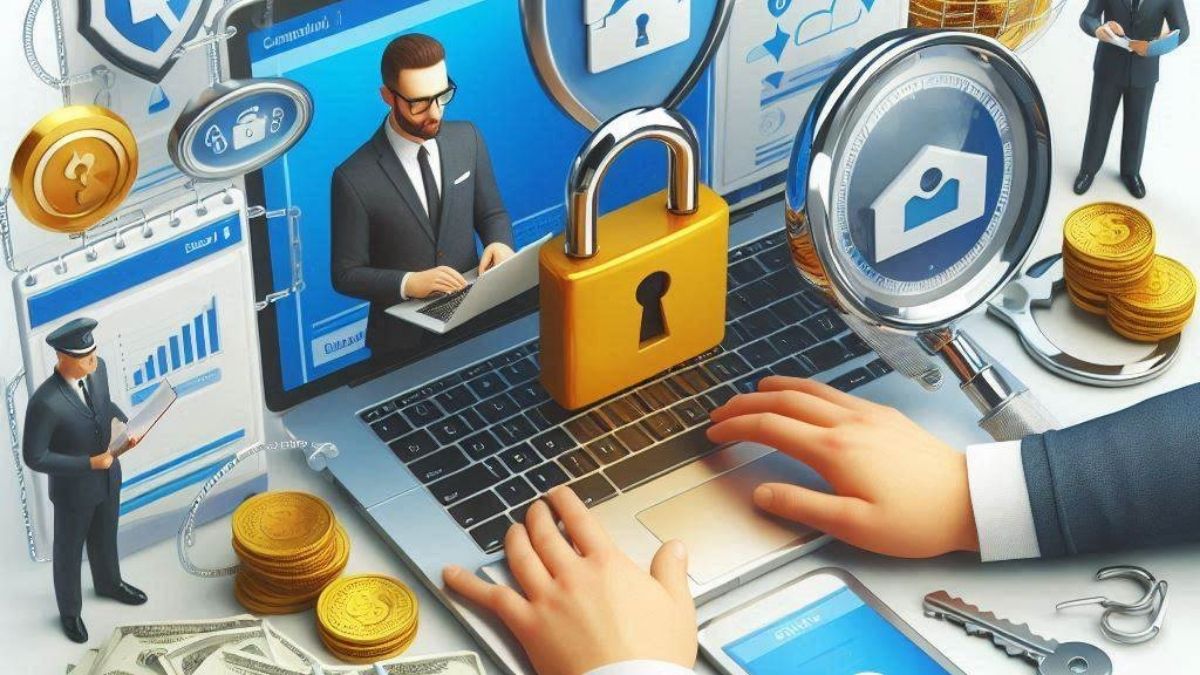
In our highly connected world, Protecting Your Online Business And Customers demands vigilance on a front that often goes unseen: cybersecurity. The internet has The truth is that no online entity, big or small, is immune to the dangers of cyber attacks.
It opened doors to global markets and unparalleled convenience, but with it comes the sobering reality of cyber threats.
Consumer data Each day, countless bits of consumer data are transmitted, processed, and stored, making security more than just a technical necessity; it’s a customer trust imperative.
Unfortunately, data breaches are more than just headlines; they’re harrowing episodes that can tarnish reputations and have tangible impacts on businesses and customers alike.
It’s not just about the immediate loss; the ripple effects can be long-lasting, eroding trust and loyalty in hard-to-repair ways. This is why securing an online business isn’t a one-and-done affair. It’s continual, a part of your everyday operations.
I strongly advocate making website security a top priority. It’s not just a measure to protect your business; it’s an ethical obligation to safeguard the customers who trust you with their personal and financial information.

With that in mind, I’d like to guide you through the essential security measures to fortify your digital presence, starting with the basic principles in the next section.
Basic Principles of Website Security
Enforcing robust website security begins with an understanding of the foundational elements. Just as you reinforce the ESSENTIAL security framework and won’t leave your home unlocked, securing your online business should start with basic critical measures to protect against unauthorized access and data breaches.
One of the ESSENTIAL steps in website security is ensuring that all data transmitted between your site and your users is encrypted.
This is where SSL/TLS certificates come into play. They create a secure connection, reassuring users that their sensitive information, like credit card details and passwords, is growing safer from prying eyes.
However, cyber threats evolve rapidly, and what’s safe today might be compromised tomorrow. Regular updates in patches are your first defense against these growing, most robust threats.,
Just as a flu shot protects you against known strains, updates safeguard your website from newly discovered vulnerabilities.
Reassuring users that their sensitive information, such as credit card details and passwords, is secure and safe. Even the most robust secure connection is becoming defenseless and can be rendered useless if entry credentials are compromised. The days of simple password protection are over.
Enabling multi-factor authentication adds layers of security, considerably decreasing the chance of unauthorized access.
Moving forward, secure practices adopted by the business must be complemented by advanced security measures that handle sophisticated threats. This will reinforce the security framework and reassure customers of your commitment to their safety.
Now that we’ve covered the basics of instituting SSL/TLS certificates and maintaining timely updates, we must consider more robust defenses. Think of these advanced security measures as a fortress that keeps your digital assets safe from the onslaught of cyber threats looming online.
Start with a web application firewall (WAF). This integral layer of security examines incoming traffic to your website and decides what to let through.
WAFs are adept at fending off common threats like SQL injection and cross-site scripting, among others. By filtering and monitoring HTTP traffic between a web application and the Internet, WAFs add an extra layer of security to fend off unwanted intrusions.
Intrusion detection systems (IDS) complement WAFs by providing constant surveillance by monitoring system activities and identifying possible incidents. IDS systems can be network-based or host-based; each complements WAFs by its strengths in detecting unauthorized access.
Encrypting sensitive customer data is critical to fostering a secure online business. Use tools and protocols like Transport Layer Security (TLS) to safeguard personal information during transmission.
Consider encryption at rest for stored data to prevent unauthorized users from accessing it even if they get past other defenses. This is vital when handling sensitive information like credit card numbers and personal identifiers.
Finally, secure your transactions using a Payment Card Industry Data Security Standard (PCI DSS) compliant payment gateway. If you process, store, or transmit credit card information. Adhering to these standards protects your customers and shields your business from the hefty fines associated with non-compliance.

Remember that upgrading your security systems is equally essential as informing and empowering your customers to protect themselves. Your efforts can go much further when your user base is knowledgeable and vigilant. Read precisely what to do in the next section.
Educating Your Customers on Safe Online Practices
It’s not just about the technical safeguards I implement; it’s vital that I also focus on the human aspect of security. I create a more secure internet environment for everyone by educating my customers on safe online practices.
As a business owner, I am responsible for establishing a culture of security awareness. This involves clear communication about potential risks and guidance on how to avoid them. I advise creating solid passwords, recognizing phishing attempts, and maintaining software updates.
Transparent communication with my customers isn’t just about ticking a box for compliance; it’s a way to foster trust and show I value their safety as much as they do. That’s why I include easy-to-understand language in my privacy policies and spell out how their data is used and protected.
I further support my customers by providing resources that empower them to take charge of their online security. This could be a dedicated section on my website with security tips, a newsletter focusing on current security issues, or even direct training sessions for more engaged users.
When my customers are informed, they’re less likely to fall victim to online scams and more likely to trust my business with their sensitive information. This responsible approach to customer education leads to a safer online community and promotes a positive reputation for my brand.
Maintaining and Monitoring Your Security Measures
You’ve taken significant steps to protect your online business and your customers. Your commitment is evident in every update you apply, every password policy you enforce, and every measure you take to educate your users.
But it’s important to understand that website security is not a one-time task; it’s a continuous process. What makes a difference is developing a proactive posture, where the focus is on consistent vigilance and improvement.
One of the best practices is continuous monitoring. This isn’t just about watching for attack attempts and understanding the patterns and behaviors that might signal a breach before it happens. Use monitoring tools that can alert you in real-time to suspicious activities. This way, you can act quickly to prevent potential breaches.
Regular security audits and risk assessments are equally critical. Audits allow you to examine your website’s security architecture from top to bottom, checking for misconfigurations, outdated software components, and unnecessary data access points that could serve as entryways for cybercriminals.
Lastly, staying informed about the latest cybersecurity trends and threats is instrumental. This knowledge helps you anticipate and prepare for potential attacks.
Subscribe to security news feeds, join relevant forums, and network with cybersecurity professionals. Doing so ensures you’re defending against today’s threats and preparing for tomorrow’s challenges.
Protecting your online business and customers is crucial for various reasons:
Builds Trust: Ensuring the security of your online platform establishes trust with your customers. They feel confident sharing their personal and financial information, leading to increased loyalty and repeat business.
Protects Data: Safeguarding customer data protects sensitive information such as credit card details, addresses, and personal preferences from falling into the wrong hands. This helps prevent identity theft, fraud, and other cybercrimes.
Maintains Reputation: A data breach or security incident can severely damage your business’s reputation. By prioritizing security, you demonstrate your commitment to safeguarding customer interests, which enhances your brand reputation.
Legal Compliance: Many jurisdictions have stringent laws and regulations regarding data protection, such as GDPR in Europe and CCPA in California. Adhering to these regulations avoids hefty fines and demonstrates ethical business practices.
Prevents Financial Loss: Cyberattacks can lead to financial losses due to theft of funds, legal liabilities, regulatory fines, and costs associated with mitigating the damage. Implementing robust security measures minimizes these risks.
Enhances Customer Experience: A secure online environment provides customers with a seamless and enjoyable experience. They can transact and interact with your business without worrying about security threats, leading to higher satisfaction.
Reduces Downtime: Security breaches often result in downtime as businesses work to address and rectify the issues. Investing in cybersecurity measures minimizes the likelihood of disruptions to your operations, ensuring business continuity.
Fosters Innovation: When customers feel secure, they are more likely to engage with new features, services, or products your business offers. This fosters innovation and encourages continuous improvement to meet evolving customer needs.
Video
In conclusion,
Protecting your online business and customers is not just about mitigating risks; it’s about building a resilient and trustworthy foundation that fosters long-term growth and success.
As we navigate the vast digital landscape, safeguarding our online businesses and cherished customers demands unwavering attention to an often unseen yet omnipresent threat: cybersecurity.
The Internet has revolutionized commerce and communication with its boundless opportunities and global connectivity. However, it also exposes us to the sobering reality of cyber threats that lurk in the shadows, ready to strike at any moment.
An avalanche of consumer data traverses the digital realm every day, underscoring the critical importance of security as more than a technical necessity—it’s a cornerstone of customer trust.
Data breaches aren’t mere headlines; they’re harrowing experiences that can inflict lasting damage, eroding trust and loyalty in difficult-to-mend ways.
Securing an online business isn’t a one-time task; it’s an ongoing commitment woven into the fabric of our daily operations. It’s a pledge to protect our companies and the individuals who entrust us with their personal and financial information.
That’s why I strongly advocate prioritizing website security as an ethical obligation to safeguard the essence of trust.
With this in mind, I invite you to explore the essential security measures outlined in this article and embark on a journey to fortify your digital presence.
From basic principles like SSL/TLS encryption to more advanced defenses such as web application firewalls and intrusion detection systems, every step taken is a stride toward fortifying our digital fortresses against the ever-looming specter of cyber threats.
But our commitment to security doesn’t end there. It extends to empowering our customers through education and transparency.
By fostering a culture of security awareness and equipping them with the knowledge to safeguard themselves, we enhance their online safety and strengthen the collective resilience of our digital community.
As you reflect on the insights shared here, I encourage you to join the conversation. Share your thoughts, experiences, and insights in the comments below.
- How do you prioritize cybersecurity in your online endeavors?
- What measures have you found most effective in Protecting Your Online Business And Customers?
Let’s exchange ideas, insights, and best practices to ensure a safer, more secure digital future for everyone.
Earl

Hey Earl,
Your post on website security is an absolute must-read for any online business owner. It highlights the critical importance of protecting both your online business and your customers from potential cyber threats. The tips and strategies provided are incredibly valuable in fortifying your website’s defences and safeguarding sensitive information. As cyber-attacks become more sophisticated, it’s essential to stay informed and proactive in implementing robust security measures. Thank you for sharing this informative piece and empowering entrepreneurs to prioritize website security!
Marios
Thank you for your thoughtful comment, Marios! I’m glad you found the post on website security essential for online business owners.
Protecting your business and customers from cyber threats is crucial, especially as cyber-attacks become increasingly sophisticated.
I’m pleased that the tips and strategies provided were valuable in helping fortify your website’s defenses and safeguard sensitive information.
Staying informed and proactive is indeed crucial to maintaining robust security measures.
Thank you for your kind words, and I’m happy to have empowered entrepreneurs like you to prioritize website security!
Best regards,
Earl
Hello. People don’t realize how important cybersecurity really is today. They don’t know that there are so many malicious actors out there constantly trying to invade your privacy and hack your website. They want to steal data. And sell it on the black market. And there are constantly people trying to do this. So website security is vital.
Thank you for your comment. You’re right—cybersecurity is more critical than ever in today’s digital World. Many people underestimate the constant threats posed by malicious actors who aim to invade privacy, hack websites, and steal data for black market sales. Ensuring robust website security is vital to protect personal and business information from these relentless attacks.
Raising awareness about these dangers and implementing strong security measures can help safeguard our online presence. Thank you for highlighting this critical issue!
Best regards,
Earl
I recently read your article and found it to be very informative and well-written. The discussion on cyber threats is particularly relevant in today’s digital landscape, and you’ve done an excellent job of outlining the key measures businesses can take to protect themselves and their customers.
This information is crucial for business owners of all business sizes to consider. I would be interested in learning more about the latest website security trends or recommended security solutions for small businesses. Do you have any additional resources or insights you could share?
Thank you for your valuable contribution to the online business world.
Sincerely,
Gabriel John
Thank you for your thoughtful comment, Gabriel! I’m glad you found the article informative and well-written. Cybersecurity is indeed a pressing concern in today’s digital landscape, and it’s vital for businesses of all sizes to implement robust security measures.
Regarding the latest website security trends and solutions for small businesses, I’d be happy to share more insights. Currently, trends like zero-trust architecture, AI-driven security solutions, and increased focus on data privacy regulations are gaining traction.
For small businesses, affordable and effective solutions include using comprehensive security platforms like Bitdefender, implementing regular security audits, and ensuring continuous employee training on cybersecurity best practices.
Thank you for your valuable feedback and for being an engaged reader!
Sincerely,
Earl
Hi there –
This article was quite extensive. Well, done.
Business owners with an online presence must prioritize cybersecurity. Even though there are multitude of ways for bad actors to access sensitive information, there are ways to stop them. Setting up webservers with HTTPS and applying SSL certificates are practical ways to thwart intrusions. Teaching employees about phishing, creating difficult passwords, and setting up multifactor authentication minimizes the chance of intrusion.
Thank you for your comment and for taking the time to read the article!
You’re absolutely right—prioritizing cybersecurity is crucial for business owners with an online presence. Implementing HTTPS and SSL certificates are fundamental steps in protecting sensitive information.
Additionally, educating employees about phishing, encouraging the use of strong passwords, and setting up multifactor authentication are all effective strategies to further safeguard against intrusions. It’s great to hear your insights on this important topic!
Earl